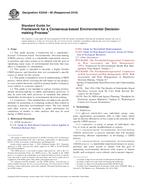We need your consent to use the individual data so that you can see information about your interests, among other things. Click "OK" to give your consent.
ASTM E2348-06(2010)
Standard Guide for Framework for a Consensus-based Environmental Decision-making Process
STANDARD published on 1.9.2010
The information about the standard:
Designation standards: ASTM E2348-06(2010)
Note: WITHDRAWN
Publication date standards: 1.9.2010
SKU: NS-45093
The number of pages: 8
Approximate weight : 24 g (0.05 lbs)
Country: American technical standard
Category: Technical standards ASTM
The category - similar standards:
Annotation of standard text ASTM E2348-06(2010) :
Keywords:
communication, consensus-based environmental decision-making, consultation, stakeholder, Consensus-based Environmental Decision-making (CBED), Environmental control/fate, Risk analysis--environmental, ICS Number Code 13.020.20 (Environmental economics)
Additional information
| Significance and Use | ||||||||
|
This standard guide is designed to help the owners and regulators of a specific environmental problem to identify and integrate affected stakeholders and establish a process to identify and work through all the key questions and answers essential to a mutually acceptable decision. This standard guide presents a “framework” that is intended to help ensure that all the CBED process components (that is, human health, ecological condition, socio-cultural values and economic well-being) are considered, but is designed to allow the user to interpret which components of the process are applicable and how these components are defined for the specific environmental problem being addressed. It also provides general guidance to help with selecting approaches and methods for specific analyses of each of the major CBED components (that is, human health, ecological condition, socio-cultural values, and economic well-being). The CBED process can be easily coupled with other relevant standards (for example Guides E1739, E1984, and E2205) and environmental compliance guidance and requirements, for example, Quality of Stakeholder-Based Decisions and Understanding Risk, CRF40 and CFR10. The CBED process is appropriate in two contexts: (1) when a specific project is proposed; and (2) when there are or may be public concerns about specific health, environmental, cultural, social or economic issues. Involving affected stakeholders actively in the decision-making process reorients that process from one dominated by regulators and owners to one that includes those who live with the consequences of the decision. This not only increases the successful implementation of decisions, but also can promote greater trust in government, industry and other institutions (P/CCRARM, 1997a). |
||||||||
| 1. Scope | ||||||||
|
1.1 This guide presents a framework for a stakeholder-focused Consensus-based Environmental Decision-making (CBED) process, which is a stakeholder-empowered, process to prioritize and select actions to be initiated with the goal of optimizing many types of environmental decisions that may affect a community or communities. 1.2 This guide is intended to describe a highly flexible CBED process, and therefore does not recommend a specific course of action for this activity. 1.3 This guide is intended to assist in implementing a CBED process, which allows assessing the full impact of any project- or issue-related decisions related to human health, ecological, socio-cultural or economic impacts. 1.4 This guide is not intended to replace existing environmental decision-making or public participation processes. It may be used with other processes or standards that address stakeholder involvement in environmental decision-making. 1.5 Limitations—This standard does not address the specific methods for generating or evaluating technical data related to assessing a particular environmental issues. The user should seek other sources on methods to gather information for completion of models or other analyses that may be used during a CBED process. |
||||||||
| 2. Referenced Documents | ||||||||
|
We recommend:
Technical standards updating
Do you want to make sure you use only the valid technical standards?
We can offer you a solution which will provide you a monthly overview concerning the updating of standards which you use.
Would you like to know more? Look at this page.




 Cookies
Cookies
